Opinion
The battle to claim Covid-19!
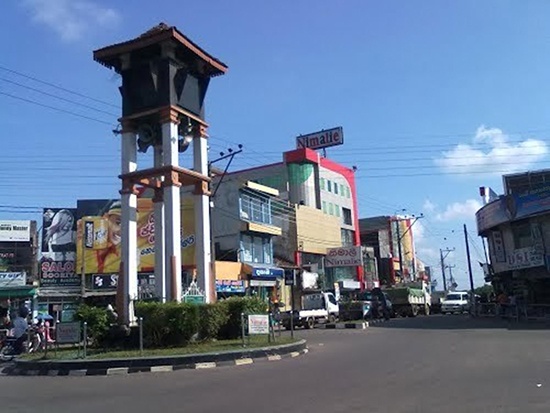
Leave the battle to those that are genuinely fighting it!
By Romesh Fernando
Covid 19 is here. We’ve known that for a while! The fact remains that each of us are vulnerable. Never mind the origin of the virus; whether it came from China, India or the US or if it was man-made or a natural occurrence.
The crux of the matter is that it is here to stay.
The Military apparatus under General Shavendra and the medical armory are wielding their might, fighting a battle day and night to keep us safe.
While all this is going on, the blame game has begun.
The pundits, Covid gurus and self-anointed investigative journalists putting pen to paper; some making sense but most others exposing their cheap brand of journalism, lacking in value and relevance.
We also have the electronic media exploiting the freedom of expression that has allowed a myriad opportunities for those seeking to spread fake news. Yes, there are a lot of these opinionated characters out there who spew out their far-fetched theories based on nothing but unjustified assumptions & factually incorrect information, which are doing the rounds. Why? Your guess is as good as mine. One thing is for sure – they’re only making the communication service providers rich!
In this day and age, people don’t need education or intelligence to know where this wanton brand of reporting originates from. A little bit of common sense will tell us it originates from the gutter. The language is poor, the information is false and the so-called freedom of expression is that of an ill-informed individual, fit only for the waste paper basket.
While the country is struggling, the misinformed population is judging and the politicians are playing the only game they know! – politics!! All while the economy is in the balance, teetering on the verge of a crash!
My humble request to all those involved in publicizing their thoughts and sharing their opinions is to take a good look in the mirror and ask, ‘What have I done to help the cause of those suffering after contracting this deadly virus?’
If nothing much comes to mind, then that says it all. It would be prudent to stay home safe and let those that are battling this war work unhindered.
Let us be realistic in terms of our responsibilities as the public.
People never took the numerous warnings seriously. That’s the hard and brutal truth.
Politicians wanted elections held to get into parliament, so they could have access to state machinery and resources to run the country!. The industry had to run in order to turn the wheels of production and give life to an already ailing economy. Thousands of employees needed to feed their families. Everyone did what they thought was needed. We heard the words “Covid is no more”. With such a mentality, It was no surprise that the health warnings and preventative efforts slipped through the public’s fingers. The result is a recurrence on the scale we now see.
Let us honestly answer these questions: How many of us attended political meetings and rallies without masks? Disregarded washing hands and sanitizing? How many of us went out shopping freely and to exhibitions, book fairs and what not, caring nought for the virus or the repercussions? How many more still attended funerals, alms-givings, weddings and mass gatherings? The list of events of exposure is endless!
Then, who do we blame? AND IS IT FAIR?
The woman from Minuwangoda was not patient zero. That’s for sure!
The government had to bring in our stranded workers from all over the world: Europe, Middle East, US and across Asia, from wherever they toiled and contributed to our economy. In that process, couldn’t we have imported virtually all strains of the virus?
This is something we couldn’t avoid. We can’t ignore the cries of our people when they are suffering and stranded in a foreign land. Our culture, our humility our nature is not one that shuns our fellow beings when in distress. Many are the stories of drowning of the hero that dived in to save another. Many are those that died in the war fighting for you and for me.
So, is it fair we blame Brandix or the Military or the Health Services or the Government or anyone else for that matter? Instead, don’t you think we need to unite, stand firm and fight this battle for one and all?
Human error and neglect are paramount in this dilemma. Let us refrain from conveniently palming off the blame to others.
Brandix, which has now hit the news for all the wrong reasons, did what they ought to.
They’re a corporate and socially responsible organisation responding to a global problem. They took it upon themselves to charter aircraft to repatriate their own staff from the Brandix industrial park in Visakapatnam. Sadly, this has been twisted and distorted to no end.
The many stories alleging bribing the government, bringing in Indians to teach us how to sew underwear, charter flights that have brought in cheap Indian labour, circumventing quarantine procedures – the list goes on and seems to be pure nonsense.
The demand for answers to questions on passenger manifests bringing in Brandix employees and their families, proof of quarantining them in designated centres, PHI union demands for proof of PHI participation in the quarantine process of monitoring, etc. are the main highlights in this theatrical enactment of twisting and distorting facts, trying to blame a corporate for the mishap of a possible community spread – a ridiculous thought to say the least.
If only each one of them spent some quality time silently checking on the facts via available media and information services- would actually help all concerned to focus more on the need of the hour – looking after our people, our country and doing what is right.
Brandix, with their unparalleled efforts in CSR, ensured their entire might was put into motion to assist in this issue of unimaginable sadness. They continue to do their part day and night and have vouched to continue to ensure they see their staff out of danger.
Their contributions to the cause are immeasurable. From giving over their plants from the word go when the pandemic hit our shores, and certainly long before the Minuwangoda case, to the many funded programmes managing our sick and affected, to continued support to the cause is exemplary to say the least. Let us hold our fire and take a step back and reflect – If you and I manage to contract the virus, we too may end up in one of the quarantine centres facilitated and supported by Brandix.
They have continued to do all this, while trying to keep their focus amidst the often baseless media slandering.
In no civilized world do we blame a pandemic on a corporate entity. This is certainly a first! Yes! corporates can have slip ups, negligence, mishaps, accidents – especially when they are of the magnitude of Brandix. But what matters is how they manage the crisis. Every corporate in today’s world has mitigation plans in place and I’m sure theirs is next to none.
While the battle rages through, with efforts to combat the pandemic from getting out of hand, there still seems to be the critiques, the politics, the raging arguments, the blame games, stories, debates, YouTube journalists and unions all with vested interests! – they will all be there! All judgmental, with conclusions to pin the blame on the culprit or scapegoat, whoever is more convenient to get a hold of! Sadly, to say the least – that’s what our culture has become in recent times.
So let’s stop the blame games, finger pointing and making this a playground for various gains. Let the authorities and the specialists do their job.
It is sheer neglect on our part as citizens. It is our foolishness. It is our failure to adhere to the repeated calls for safety. The culprit is you and me!
Many the sinks in place for washing. And many a tap without water and many an empty bottle of detergent or soap. Stylish foot pedals no longer work. Many a mask, only for the protection of our chins! Why? Because we cared less.
Let us pause for a moment to ponder on the agony that would run through the mind of the individual that has been exposed. Let us pause to ponder on the agony of those who see their loved ones being driven away in an ambulance with beacons of red or blue into centres for quarantine. Have you had the chance to ask a mother, father, brother, or sister, whose loved one got taken away, what runs through their minds living this nightmare?
Do you have the slightest feel of what runs through a parent’s mind, whose child is taken in for treatment to a centre with no visitation? Or, know what traumatic thoughts run through the mind of a child being taken away for treatment?
While we’re at it reading our Sunday paper, we know that there’s a massive effort in operation to care for the sick and their families.
As business associates of Brandix for many years, we’re certain our fellow associates are not alone. Much is being done to ensure those affected are cared for. The organisation is working round the clock. Let us rally around the corporate in support and solidarity to cope with this situation at hand. After all, we’re all a part of the family that work and live contributing to our economy which continue to be fueled by the likes of corporates like Brandix.
Currently, the global pandemic figures are worrying, yet recoveries are many and deaths sadly still high;
Globally:
38,806,674 cases, 1,097,966 deaths, 29,158,331 recoveries.
In Sri Lanka to date:
5,170 cases, 13 deaths, 3,380 recoveries.
So, let us be thankful for small mercies and those that have recovered.
Let’s continue to pray that those affected will recover fast and return home soon. For our part, let’s be compassionate and humane and refrain from dabbling in words and expressions that are at the expense of others or detrimental to the cause. Instead let’s support the fight in every way possible for the safety and well-being of society.
- News Advertiesment
See Kapruka’s top selling online shopping categories such as Toys, Grocery, Flowers, Birthday Cakes, Fruits, Chocolates, Clothing and Electronics. Also see Kapruka’s unique online services such as Money Remittence,News, Courier/Delivery, Food Delivery and over 700 top brands. Also get products from Amazon & Ebay via Kapruka Gloabal Shop into Sri Lanka.
Opinion
Take Human Rights seriously, not so much the council or office
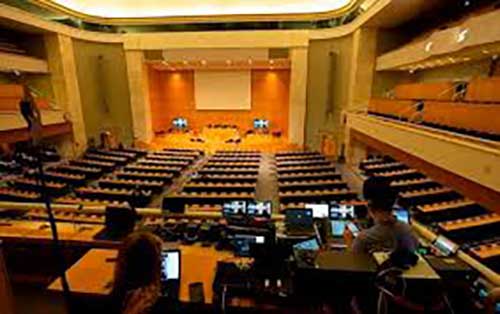
By Dr Laksiri Fernando
The 46th Session of the UN Human Rights Council started on 22 February morning with obvious hiccups. The Office, to mean the Office of the UN High Commissioner for Human Rights, finally decided to hold all sessions virtually online, only the President of the Council and the assistants in the high table sitting at the UN Assembly Hall in Geneva. The President, Ms. Nazhat Shammen Khan, Ambassador from Fiji in Geneva, wearing a saree, was graceful in the chair with empty seats surrounding.
In the opening session, the UN General Assembly President, UN General Secretary, UN High Commissioner for Human Rights, and Head of Foreign Affairs, Switzerland (as the host country), addressed remotely the session. In fact, there was no need for Switzerland to have a special place, as the UN is independent from any host country. Switzerland is fairly ok, however, if this tradition is followed, the UN General Assembly may have to give a special place to the US in New York.
Initial Addresses
UN General Secretary, Antonio Guterres’ address could have been quite exemplary if he gave a proper balance to the developed and developing countries. He talked about racism and fight against racism but did not mention where racism is overwhelmingly rampant (US and Europe) and what to do about it. Outlining the human rights implications of Covid-19 pandemic, he made quite a good analysis. It was nice for him to say, ‘human rights are our blood line (equality), our lifeline (for peace) and our frontline (to fight against violations).’ However, in the fight against violations, he apparently forgot about the ‘blood line’ or the ‘lifeline’ quite necessary not to aggravate situations through partiality and bias. He never talked about the importance of human rights education or promoting human rights awareness in all countries.
His final assault was on Myanmar. Although he did not call ‘genocide,’ he denounced the treatment of Rohingyas as ethnic cleansing without mentioning any terrorist group/s within. His call for the release of Aung San Suu Kyi and other civilian leaders undoubtedly should be a common call of all. However, he did not leave any opening for a dialogue with the military leaders or bring back a dialogue between Aung San and Min Aung, the military leader. With a proper mediation, it is not impossible. Calling for a complete overhaul as the young demonstrators idealistically claim might not be realistic.
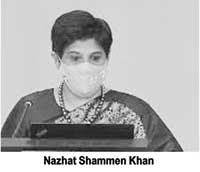 High Commissioner Michelle Bachelet’s address was brief and uncontroversial this time without mentioning any country or region. It is clear by now perhaps she is not the real author of the Report against Sri Lanka, but someone probably hired by the so-called core-group led by Britain. Her major points were related to the coronavirus pandemic trying to highlight some of the socio-economic disparities and imbalances of policy making that have emerged as a result. The neglect of women, minorities, and the marginalized sections of society were emphasized. But the poor was not mentioned. As a former medical doctor, she also opted to highlight some of the medical issues underpinning the crisis.
High Commissioner Michelle Bachelet’s address was brief and uncontroversial this time without mentioning any country or region. It is clear by now perhaps she is not the real author of the Report against Sri Lanka, but someone probably hired by the so-called core-group led by Britain. Her major points were related to the coronavirus pandemic trying to highlight some of the socio-economic disparities and imbalances of policy making that have emerged as a result. The neglect of women, minorities, and the marginalized sections of society were emphasized. But the poor was not mentioned. As a former medical doctor, she also opted to highlight some of the medical issues underpinning the crisis.
Then came the statements from different countries in the first meeting in the following order: Uzbekistan, Colombia, Lithuania, Afghanistan, Poland, Venezuela, Finland, Fiji, Moldova, Georgia, Kazakhstan, Equatorial Guinea, Vietnam, Belgium, and Morocco. The obvious purposes of these statements were different. Some countries were apparently canvassing for getting into the Human Rights Council at the next turn perhaps for the purpose of prestige. Some others were playing regional politics against their perceived enemies. This was very clear when Lithuania and Poland started attacking Russia.
But there were very sincere human rights presentations as well. One was the statement by the President of Afghanistan, Mohammad Ashraf Ghani. He outlined the devastating effects that Afghanistan had to undergo during the last 40 years, because of foreign interferences. The initial support to Taliban by big powers was hinted. His kind appeal was to the UN was to go ‘beyond discourse to practice’ giving equal chance to the poor and the developing countries to involve without discrimination.
Controversial Presentations
China’s Foreign Affairs Minister, Wang Yi, made his presentation almost at the end of the first day. This is apparently the first time that China had directly addressed the Human Rights Council. Beginning with outlining the devastating repercussions of the coronavirus pandemic he stressed that the world should face the challenges through ‘solidarity and cooperation.’ He broadened the concept to human rights solidarity and cooperation. His expressed views were quite different to the others, particularly to the Western ones.
He frankly said that what he expresses are the views of China on human rights without claiming those are absolute truths or forcing others to believe or implement them. There were four main concepts that he put forward before the member countries. First, he said, “We should embrace a human rights philosophy that centres on the people. The people’s interests are where the human rights cause starts and ends.” Second, he said, “we should uphold both universality and particularity of human rights. Peace, development, equity, justice, democracy, and freedom are common values shared by all humanity and recognized by all countries.” “On the other hand,” he said, “countries must promote and protect human rights in light of their national realities and the needs of their people.”
“Third,” he said, “we should systemically advance all aspects of human rights. Human rights are an all-encompassing concept. They include civil and political rights as well as economic, social, and cultural rights.” He then emphasized, “Among them, the rights to subsistence and development are the basic human rights of paramount importance.” Fourth, “we should continue to promote international dialogue and cooperation on human rights. Global human rights governance should be advanced through consultation among all countries.”
It was on the same first day before China, that the United Kingdom launched its barrage against several countries not sparing Sri Lanka. The Foreign Secretary, Dominic Raab, delivered the statement from top to bottom attacking alleged violating countries on human rights. But there was no mentioning of Israel for the repression of Palestinians or the systemic racism rampaging in the United States, including the 6 January attacks on the Capitol by extremist/terrorist groups.
His first sermon was on Myanmar without acknowledging the British atrocities or mismanagement of this poor and diverse country during the colonial period. He was quite jubilant over implementing sanctions and other restrictions over the country. Many sanctions, in my opinion, are extortions. Undoubtedly, Aung San Suu Kyi and other leaders should be released, and democracy restored. This is a task of the whole council and when one or two countries try to grab the credit, there can be obvious reservations of others.
His further scathing attacks were against Belarus, Russia, and China. Some appeared factually correct but not necessarily the approach or the motives genuine. The following is the way he came around Sri Lanka. He said,
“Finally, we will continue to lead action in this Council: on Syria, as we do at each session; on South Sudan; and on Sri Lanka, where we will present a new resolution to maintain the focus on reconciliation and on accountability.”
‘Action’ to him basically means repeatedly passing resolutions, of course imposing economic and other sanctions. He said, “as we do at each session”; like bullying poor or weak countries at each session. Can there be a resolution against Russia or China? I doubt it.
What would be the purpose of presenting a resolution against Sri Lanka? As he said, “to maintain the focus on reconciliation and on accountability.” This will satisfy neither the Tamil militants nor the Sinhalese masses. But it might satisfy the crafty Opposition (proxy of the defeated last government). This is not going to be based on any of the actual measures that Sri Lanka has taken or not taken on reconciliation or accountability. But based on the ‘Authoritarian and Hypocritical Report’ that some anti-Sri Lankans have drafted within the Office of the High Commissioner for Human Rights. This what I have discussed in my last article.
In this context, successful or not, the statement made by the Sri Lanka’s Minister of External Affairs, Dinesh Gunawardena, in rejecting any resolution based on the foxy Report of the Office of the UN High Commissioner for Human Rights, in my concerned opinion, is absolutely correct.
Opinion
President’s energy directives ignored by the Power Ministry: Another Point of View

Dr Tilak Siyambalapitiya
Dr Janaka Rathnasiri laments (The Island 19 Feb 2021) that the Power Ministry has ignored the President’s directive to draw 70% of energy from renewable sources by 2030. I saw the approved costs of electricity production for 2019, published by the Public Utilities Commission (PUCSL).
PUCSL has also approved the prices to sell electricity to customers. Although various customers pay at various “approved” prices, the average income from such “approved” prices in 2019 was Rs 17.02 per unit. It is not only the Ministry, according to Dr Rathnasiri, ignoring the President; PUCSL is also breaking the law, which says prices and approved costs should be equal.
 So there is already an illegal gap of Rs 21.59 minus 17.02 = Rs 4.57 per unit of electricity sold. If electricity prices are not to be increased, as stated by many in the government and PUCSL, let us say the following: Distribution costs should decrease by 0.57 Rs per unit. Generation costs should decrease by Rs 4.00 per unit.
So there is already an illegal gap of Rs 21.59 minus 17.02 = Rs 4.57 per unit of electricity sold. If electricity prices are not to be increased, as stated by many in the government and PUCSL, let us say the following: Distribution costs should decrease by 0.57 Rs per unit. Generation costs should decrease by Rs 4.00 per unit.
PUCSL also published the approved cost of purchasing or producing electricity from various sources for 2019. The actual energy values were different to what was approved, but let us stick to PUCSL approved figures:
I suggest Dr Rathnasiri fills-up the following table, to show how much electricity will cost in 2030 to produce and deliver, if the President’s 70% target is to be achieved and for PUCSL to abide by the law. Let us assume that electricity requirement in 2030 will be double that of 2019.
 Since PUCSL has to save Rs 4 from 13.92, the average selling price for energy should be Rs 13.92 minus 4.00 = Rs 9.92. With a target network loss of 7% (in 2019 it was 8.4%), the average cost of production has to be Rs 9.27 per unit. Eight cages have to be filled-up by Dr Rathnasiri.
Since PUCSL has to save Rs 4 from 13.92, the average selling price for energy should be Rs 13.92 minus 4.00 = Rs 9.92. With a target network loss of 7% (in 2019 it was 8.4%), the average cost of production has to be Rs 9.27 per unit. Eight cages have to be filled-up by Dr Rathnasiri.
In 2012, PUCSL approved the energy cost of electricity produced from coal power to be 6.33 Rs per kWh. In 2019, PUCSL approved 9.89 (56% increase). For renewable energy, it was 13.69 in 2012, and 19.24 in 2019 (a 40% increase, but double the price of electricity from coal fired generation). In 2012, rooftop solar was not paid for: only give and take, but now paid Rs 22, against Rs 9.89 from coal. There seems to be something wrong. The price reductions of renewable energy being promised, being insulated from rupee depreciation, are not happening? Either Sri Lanka must be paying too little for coal, or it may be renewable energy is severely over-priced?
On coal we hear only of some corruption every now and then; so Sri Lanka cannot be paying less than it costs, for coal.
Enough money even to donate
vaccines
 Another reason for the Ministry of Power to ignore the President’s directive may be the Ministry’s previous experience with similar Presidential directives. In 2015, the President at that time cancelled the Sampur coal-fired power plant, and the Ministry faithfully obliged. That President and that Prime Minister then played ball games with more power plants until they were thrown out of power, leaving a two-billion-dollar deficit (still increasing) in the power sector. Not a single power plant of any description was built.
Another reason for the Ministry of Power to ignore the President’s directive may be the Ministry’s previous experience with similar Presidential directives. In 2015, the President at that time cancelled the Sampur coal-fired power plant, and the Ministry faithfully obliged. That President and that Prime Minister then played ball games with more power plants until they were thrown out of power, leaving a two-billion-dollar deficit (still increasing) in the power sector. Not a single power plant of any description was built.
Where is this deficit? You do not have to look far. In the second table, replace 24.43 with 9.89, to reflect what would have happened if Sampur was allowed to be built. The value 12.79 will go down to 8.55, well below the target of Rs 9.27 per unit to produce. Not only would CEB and LECO report profits, but the government too could have asked for an overdraft from CEB to tide over any cash shortfalls in the treasury. All this with no increase in customer prices. Producers of electricity from renewable energy could enjoy the price of 19.24 Rs per unit. And that blooming thing on your rooftop can continue to enjoy Rs 22 per unit. The Minister of Power, whom Dr Rathnasiri wants to replace with an army officer, would have been the happiest.
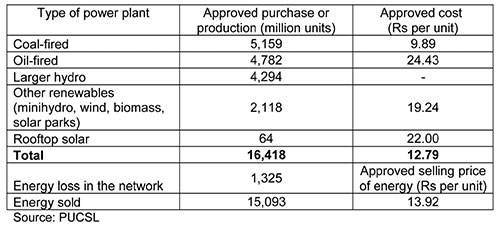 In the absence of Sampur (PUCSL’s letter signed by Chairman Saliya Mathew confirmed cancellation and asked CEB not to build it), PUCSL approved electricity to be produced at Rs 21.59 and sold at Rs 17.02 per unit. The annual loss would be Rs (21.59 – 17.02) x 15,093 = Rs 69 billion per year of approved financial loss. Sri Lanka has a Telecom regulator, an Insurance regulator, a Banking regulator, who never approve prices below costs. Sometime ago the telecom regulator asked the operators to raise the prices, when operators were proposing to reduce prices amidst a price war. But the electricity industry regulator is different: he approves costs amounting to 27% more than the price, not just once but, but continuously for ten long years !
In the absence of Sampur (PUCSL’s letter signed by Chairman Saliya Mathew confirmed cancellation and asked CEB not to build it), PUCSL approved electricity to be produced at Rs 21.59 and sold at Rs 17.02 per unit. The annual loss would be Rs (21.59 – 17.02) x 15,093 = Rs 69 billion per year of approved financial loss. Sri Lanka has a Telecom regulator, an Insurance regulator, a Banking regulator, who never approve prices below costs. Sometime ago the telecom regulator asked the operators to raise the prices, when operators were proposing to reduce prices amidst a price war. But the electricity industry regulator is different: he approves costs amounting to 27% more than the price, not just once but, but continuously for ten long years !
That is 370 million dollars per year as of 2019, the economy is spending, and for years to come, to burn oil (and say we have saved the environment). Did the Minister of Health say we are short of 160 million dollars to buy 40 million doses of the vaccine? Well, being a former Minister of Power, she now knows which Presidential “order” of 2015 is bleeding the economy of 370 million dollars per year, adequate to buy all vaccines and donate an equal amount to a needy country.
Prices are the production costs approved by PUCSL for 2019. The selling price approved by the same PUCSL was Rs 9.27 per unit.
Opinion
Confusion on NGOs and NSOs in Sri Lanka
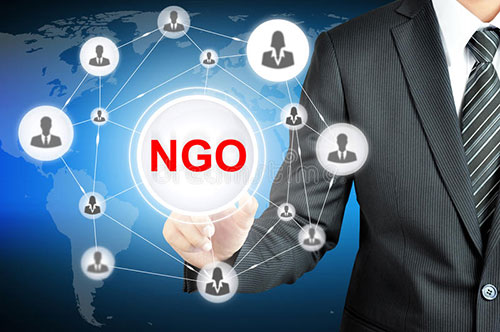
If you listen to politicians and journalists here, you will hear of that curious creature rajya novana sanvidane, a Non-State Organization (NSO). Where do you get them? In the uninstructed and dead minds of those who use those terms. In the real world, where politicians and journalists have developed minds, there are Non-Governmental Organizations (NGO). The United Nations is an organization set up by state parties, not by governments. It is true that agents of states, governments, make the United Nations work or fail. Governments may change but not the states, except rarely. When Eritrea broke away from Ethiopia, a new state was formed and was so recognised by the United Nations. However, the LTTE that tried to set up another state was crushed by the established state that it tried to break away from, and the UN had nothing to do with them.
This entirely unnecessary confusion, created out of ignorance, is so destructive that organizations completely loyal to the existing state, are made to be traitorous outfits, for they are ‘non-state organizations’ within the state. There are citizens of each state, but no citizens of any government. Government is but an instrument of the state. In most states there are organizations, neither of the state nor of government: religious organizations including churches. But none of them is beyond the pale of the state.
Those that speak of rajya novana sanvidane give that name partly because they have no idea of the origin of non-governmental organizations. NGOs came into the limelight, as donor agencies, noticed that some governments, in East Africa, in particular, did not have the capacity and the integrity to use the resources that they provided. They construed, about 1970, that NGOs would be a solution to the problem. Little did they realize that some NGOs themselves would become dens of thieves and brigands. I have not seen any evaluation of the performance of NGOs in any country. There was an incomplete essay written by Dr. Susantha Gunatilleka. NGOs are alternatives to the government, not to the state.
Our Constitution emphatically draws a distinction between the government and state, and lays down that the President is both Head of Government and Head of State (Read Article 2 and Article 30 of the Constitution.) It is as head of state that, he/she is the Commander of the Armed Forces, appoints and receives ambassadors and addresses Parliament annually, when a prorogued Parliament, reconvenes. He/she presides over the Cabinet as head of government. The distinction is most clear, in practice, in Britain where Queen Elizabeth is the head of state and Boris Johnson is the Prime Minister and head of government. However, in principle, Johnson is the Queen’s First Minister appointed by the sovereign, and resigns by advising her of his decision to do so.
In the US and in India the term ‘state’ has special significance. In India there is a ‘rajya sabha’ (the Council of States) whose members represent constituent States and Union Territories. Pretty much the same is true of the United States. In the US, executive power is vested in the President and heads the administration, government in our parlance. The Head of State does not come into the Constitution but those functions that one associates with a head of state are in the US performed by the President of the Republic. The US President does not speak of my state (mage rajaya) but of my administration, (mage anduva). Annually, he addresses Congress on the State of the Union. Our present President must be entirely familiar with all this, having lived there as a citizen of the US for over a decade. It is baffling when someone speaks of a past state as a traitor to that same state. It is probable that a government was a traitor to the state. ‘Treason against the United States, shall consist only in levying war against them, or in adhering to their (States’) enemies, giving them aid and comfort’. That a state was a traitor to the same state is gobbledygook.
Apart from probable confusion that we spoke of in the previous paragraph, it is probable that a president and other members of a government, including members of the governing party here, find it grandiloquent to speak of his/her/their state (mage/ape rajaya), rather than my government (mage anduva) or Sirisena anduva’ and not Sirisena state; it was common to talk of ‘ape anduva’ in 1956; politicians in 1956 were far more literate then than they are now.
When translating from another language, make sure that you understand a bit of the history of the concept that you translate. A public school in the US is not the same as a public school in the UK.
MAHADENAMUTTA









